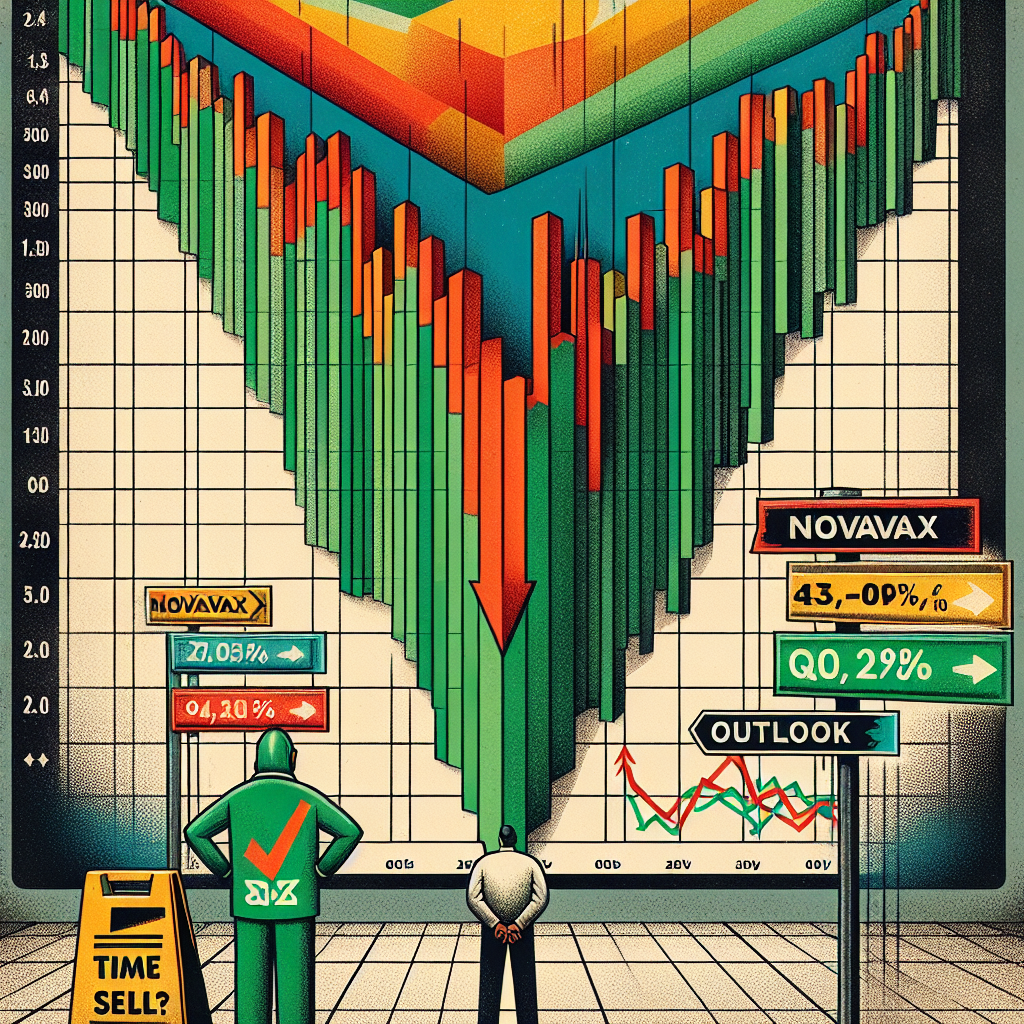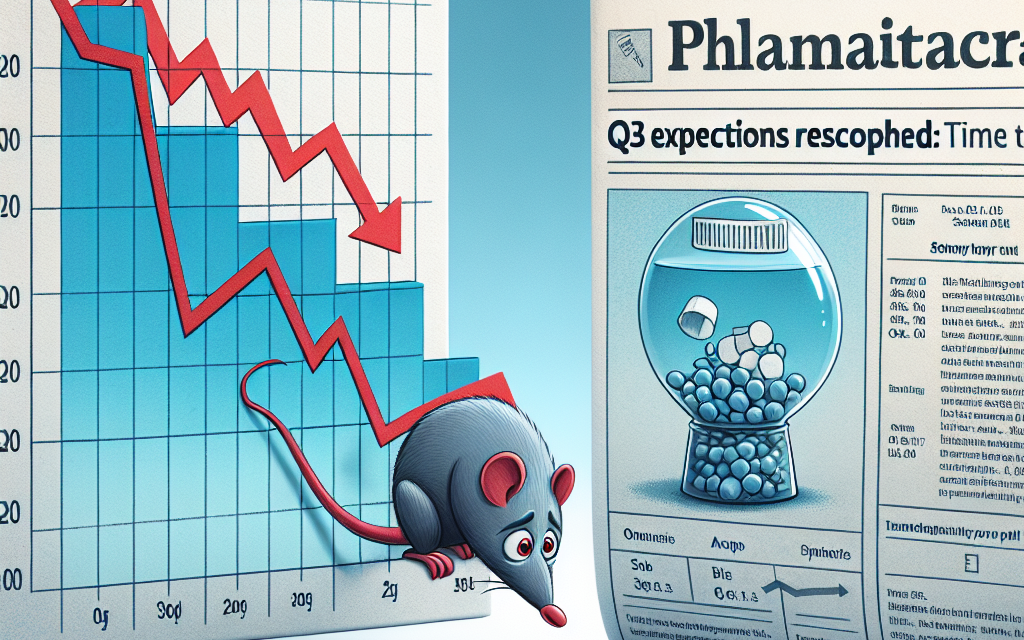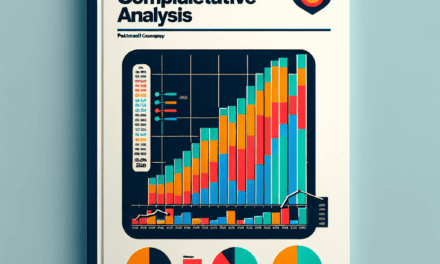“Exceeded Expectations, Lowered Outlook: Is It Time to Reconsider Your Novavax Investment?”
Introduction
Novavax, a biotechnology company known for its innovative vaccine development, recently reported its third-quarter financial results, surpassing market expectations. Despite this positive performance, the company has revised its future outlook downward, raising concerns among investors and analysts. This adjustment in guidance has prompted a reevaluation of Novavax’s stock potential, leading to discussions on whether it might be an opportune moment to sell. The decision to lower the outlook, despite exceeding quarterly expectations, reflects the challenges and uncertainties the company faces in the competitive and rapidly evolving vaccine market. As stakeholders assess the implications of this revised forecast, the question remains: Is it time to sell Novavax shares?
Novavax’s Q3 Performance: A Closer Look at the Numbers
In the third quarter of the fiscal year, Novavax reported financial results that exceeded market expectations, yet the company simultaneously revised its future outlook downward, prompting investors to reassess their positions. This juxtaposition of surpassing quarterly expectations while lowering future guidance has sparked a debate among stakeholders about the potential implications for the company’s stock. To understand the nuances of this situation, it is essential to delve into the specifics of Novavax’s Q3 performance and the factors influencing its revised outlook.
Novavax’s third-quarter results were marked by a notable increase in revenue, driven primarily by the continued demand for its COVID-19 vaccine. The company reported revenues that exceeded analysts’ forecasts, showcasing its ability to capitalize on the global vaccination drive. This performance was bolstered by strategic partnerships and expanded distribution channels, which facilitated broader access to its vaccine. Moreover, Novavax’s efforts in scaling up production capabilities played a crucial role in meeting the heightened demand, thereby contributing to its robust financial performance during the quarter.
Despite these positive results, Novavax’s decision to lower its future outlook has raised questions about the sustainability of its current momentum. The company cited several factors influencing this revised guidance, including uncertainties in the global vaccine market and potential challenges in maintaining its competitive edge. As the pandemic evolves, the demand for COVID-19 vaccines is expected to fluctuate, influenced by factors such as vaccine saturation in key markets and the emergence of new variants. These dynamics necessitate a cautious approach, prompting Novavax to adjust its projections accordingly.
Furthermore, the competitive landscape in the vaccine industry is intensifying, with numerous players vying for market share. This increased competition poses a challenge for Novavax, as it must continuously innovate and differentiate its offerings to maintain its position. The company’s ability to navigate these competitive pressures will be critical in determining its long-term success. Additionally, regulatory hurdles and supply chain constraints remain potential obstacles that could impact Novavax’s operational efficiency and financial performance in the coming quarters.
In light of these considerations, investors are faced with the dilemma of whether to hold or sell their Novavax shares. On one hand, the company’s strong Q3 performance demonstrates its capability to deliver results, suggesting potential for future growth. On the other hand, the lowered outlook reflects the inherent risks and uncertainties that could hinder its progress. Investors must weigh these factors carefully, taking into account their risk tolerance and investment objectives.
Ultimately, the decision to sell or retain Novavax shares hinges on individual perspectives regarding the company’s ability to adapt to the evolving market landscape. While the lowered outlook may signal caution, it also underscores Novavax’s proactive approach in managing expectations and navigating potential challenges. As the company continues to refine its strategies and explore new opportunities, its future trajectory will depend on its agility and resilience in the face of an ever-changing environment.
In conclusion, Novavax’s Q3 performance presents a complex narrative of success tempered by caution. The company’s ability to exceed expectations in the short term is commendable, yet the lowered outlook serves as a reminder of the uncertainties that lie ahead. Investors must carefully consider these dynamics as they evaluate their positions, recognizing that the path forward for Novavax is shaped by both its achievements and the challenges it must overcome.
Understanding Novavax’s Revised Financial Outlook
Novavax, a biotechnology company known for its innovative vaccine development, recently reported its third-quarter financial results, surpassing market expectations. Despite this achievement, the company has revised its financial outlook for the remainder of the fiscal year, prompting investors to reassess their positions. This development raises the question: is it time to sell Novavax shares?
To understand the implications of Novavax’s revised financial outlook, it is essential to first examine the factors that contributed to the company’s better-than-expected third-quarter performance. Novavax’s success can be attributed to its strategic focus on expanding its vaccine portfolio and securing key partnerships. The company’s COVID-19 vaccine, Nuvaxovid, has played a significant role in driving revenue growth, as it continues to gain traction in various international markets. Additionally, Novavax has been actively working on developing vaccines for other infectious diseases, which has further bolstered investor confidence.
However, despite these positive developments, Novavax has decided to lower its financial outlook for the upcoming quarters. This decision is primarily driven by several external factors that have introduced uncertainty into the company’s future revenue streams. One of the main challenges Novavax faces is the evolving competitive landscape in the vaccine industry. With numerous pharmaceutical giants vying for market share, Novavax must navigate an increasingly crowded field, which could impact its pricing power and market penetration.
Moreover, regulatory hurdles continue to pose a significant challenge for Novavax. The company must ensure that its vaccines meet stringent safety and efficacy standards set by health authorities worldwide. Any delays or setbacks in obtaining regulatory approvals could hinder Novavax’s ability to bring its products to market in a timely manner, thereby affecting its financial performance.
In addition to these industry-specific challenges, Novavax is also grappling with broader economic factors that could influence its financial outlook. The global economic environment remains uncertain, with inflationary pressures and supply chain disruptions affecting various sectors. These macroeconomic conditions could potentially impact Novavax’s production costs and profit margins, further complicating its financial projections.
Given these considerations, investors are left to ponder whether it is prudent to sell Novavax shares in light of the company’s revised outlook. On one hand, the lowered financial guidance may signal potential headwinds that could affect the company’s growth trajectory. Investors who prioritize short-term gains might view this as an opportune moment to divest and seek opportunities elsewhere.
On the other hand, long-term investors may choose to remain patient, recognizing that Novavax’s core strengths and strategic initiatives could yield substantial returns in the future. The company’s commitment to innovation and its ability to adapt to changing market dynamics may position it well for sustained growth over the long haul. Furthermore, Novavax’s efforts to diversify its vaccine portfolio and expand its global footprint could mitigate some of the risks associated with its revised outlook.
In conclusion, while Novavax’s decision to lower its financial outlook may raise concerns among investors, it is crucial to consider the broader context in which the company operates. The challenges it faces are not insurmountable, and its strategic initiatives could pave the way for future success. Ultimately, the decision to sell Novavax shares should be based on individual investment goals and risk tolerance, taking into account both the short-term uncertainties and the long-term potential of the company.
Market Reactions to Novavax’s Updated Guidance
Novavax, a biotechnology company known for its innovative vaccine development, recently reported its third-quarter earnings, surpassing market expectations. Despite this positive performance, the company has adjusted its financial outlook for the remainder of the fiscal year, prompting a wave of reactions from investors and analysts alike. This development raises the question: is it time to sell Novavax shares?
To begin with, Novavax’s third-quarter results were indeed impressive. The company reported higher-than-expected revenue, driven primarily by the continued demand for its COVID-19 vaccine. This success can be attributed to the company’s strategic partnerships and its ability to navigate the complex regulatory landscape, ensuring timely distribution of its vaccine across various markets. Furthermore, Novavax’s efforts to expand its product pipeline have shown promise, with several candidates in different stages of clinical trials. These factors contributed to the company’s robust financial performance, which initially buoyed investor confidence.
However, the optimism surrounding Novavax’s third-quarter results was tempered by the company’s revised guidance for the upcoming quarters. Novavax cited several challenges that could impact its future performance, including potential supply chain disruptions, evolving competitive dynamics, and uncertainties in global vaccination campaigns. These factors have led the company to adopt a more cautious outlook, which has, in turn, influenced market sentiment.
In light of Novavax’s updated guidance, investors are now faced with a critical decision. On one hand, the company’s strong third-quarter performance and its ongoing efforts to diversify its product offerings suggest a promising future. Novavax’s commitment to innovation and its ability to adapt to changing market conditions are indicative of a resilient business model. Moreover, the global demand for vaccines remains high, providing a steady revenue stream for the company.
On the other hand, the revised outlook highlights potential risks that could hinder Novavax’s growth trajectory. The competitive landscape in the vaccine industry is intensifying, with several major players vying for market share. Additionally, geopolitical factors and regulatory hurdles could pose significant challenges to Novavax’s expansion plans. These uncertainties may lead some investors to adopt a more cautious approach, considering the possibility of selling their shares to mitigate potential losses.
Ultimately, the decision to sell Novavax shares hinges on an individual’s risk tolerance and investment strategy. For those with a long-term perspective, the company’s strong fundamentals and growth potential may outweigh the short-term uncertainties. Conversely, investors with a lower risk appetite may prefer to capitalize on the recent gains and reallocate their resources to more stable opportunities.
In conclusion, Novavax’s recent performance and updated guidance have sparked a complex debate among investors. While the company’s third-quarter results exceeded expectations, the revised outlook underscores the challenges that lie ahead. As market participants weigh the potential risks and rewards, the decision to sell Novavax shares will depend on a careful assessment of the company’s prospects and an individual’s investment objectives. As always, it is advisable for investors to conduct thorough research and consult with financial advisors before making any significant investment decisions.
Investment Strategies: Hold or Sell Novavax Shares?

Novavax, a biotechnology company known for its innovative vaccine development, recently reported its third-quarter earnings, surpassing market expectations. Despite this positive performance, the company has adjusted its financial outlook downward, prompting investors to reassess their positions. This development raises a critical question for stakeholders: is it time to sell Novavax shares, or should they hold onto their investments?
To begin with, Novavax’s third-quarter results were indeed impressive. The company reported higher-than-expected revenue, driven by increased demand for its COVID-19 vaccine. This success can be attributed to the company’s ability to navigate the complex landscape of vaccine distribution and its commitment to addressing global health challenges. The robust performance in the third quarter reflects Novavax’s operational efficiency and strategic partnerships, which have bolstered its market position.
However, despite these encouraging results, Novavax has revised its financial outlook for the coming quarters. The company cited several factors contributing to this decision, including potential challenges in the global vaccine market and uncertainties surrounding regulatory approvals. These elements have introduced a level of unpredictability that could impact Novavax’s future revenue streams. Consequently, the revised outlook has sparked concerns among investors about the company’s long-term growth prospects.
In light of these developments, investors are faced with a dilemma: should they hold onto their Novavax shares or consider selling them? On one hand, holding onto the shares could be a prudent decision for those who believe in the company’s long-term potential. Novavax has demonstrated resilience and adaptability in a rapidly changing market, and its commitment to innovation could yield significant returns in the future. Moreover, the company’s ongoing research and development efforts, particularly in the field of vaccine technology, may lead to new breakthroughs that could enhance its competitive edge.
On the other hand, selling Novavax shares might be a viable option for investors seeking to mitigate risk. The downward revision of the financial outlook suggests that the company may face headwinds in the near term. By selling their shares, investors could capitalize on the current market value and reallocate their resources to other opportunities with more stable growth prospects. Additionally, the broader economic environment, characterized by inflationary pressures and geopolitical tensions, may further influence investor sentiment and market dynamics.
Ultimately, the decision to hold or sell Novavax shares hinges on individual investment strategies and risk tolerance. Investors must carefully evaluate the company’s fundamentals, market conditions, and their own financial goals before making a decision. It is essential to consider both the potential rewards and risks associated with maintaining a position in Novavax.
In conclusion, while Novavax’s third-quarter performance exceeded expectations, the revised financial outlook has introduced a layer of complexity for investors. The choice between holding or selling shares is not straightforward and requires a nuanced understanding of the company’s trajectory and the broader market landscape. As with any investment decision, thorough research and strategic planning are crucial to navigating the uncertainties and maximizing potential returns.
Analyzing Novavax’s Competitive Position in the Vaccine Market
Novavax, a biotechnology company known for its innovative approach to vaccine development, recently reported third-quarter earnings that exceeded market expectations. Despite this positive news, the company has adjusted its financial outlook for the remainder of the fiscal year, prompting investors to reassess their positions. This development raises the question: is it time to sell Novavax shares, or does the company still hold a competitive edge in the vaccine market?
To understand Novavax’s current standing, it is essential to consider the broader context of the vaccine industry. The company gained significant attention during the COVID-19 pandemic with its protein-based vaccine, which offered an alternative to the mRNA vaccines developed by Pfizer-BioNTech and Moderna. Novavax’s vaccine was particularly appealing to individuals and countries seeking a more traditional vaccine platform. However, as the pandemic has evolved, so too has the competitive landscape. The initial urgency for COVID-19 vaccines has diminished, and the market is now characterized by a surplus of supply and a decline in demand.
In this environment, Novavax faces several challenges. The company must navigate regulatory hurdles, manage production costs, and compete with established players who have already secured significant market share. Moreover, the emergence of new variants and the potential need for updated vaccines add layers of complexity to the competitive dynamics. Despite these challenges, Novavax has demonstrated resilience and adaptability, as evidenced by its recent financial performance.
The company’s ability to surpass third-quarter expectations can be attributed to several factors. Novavax has been successful in expanding its global footprint, securing contracts with various governments and international organizations. Additionally, the company has made strides in diversifying its product portfolio beyond COVID-19 vaccines. This strategic diversification is crucial for maintaining relevance in a post-pandemic world, where the focus is shifting towards other infectious diseases and potential future pandemics.
Nevertheless, the decision to lower its financial outlook suggests that Novavax is exercising caution in response to market uncertainties. This conservative approach may be prudent, given the unpredictable nature of the vaccine market and the potential for unforeseen challenges. However, it also raises concerns about the company’s ability to sustain its growth trajectory in the face of intensifying competition.
For investors, the decision to hold or sell Novavax shares hinges on several considerations. On one hand, the company’s innovative technology and strategic partnerships position it well for long-term success. On the other hand, the immediate market conditions and the lowered financial outlook may warrant a more cautious approach. Investors must weigh the potential for future growth against the risks associated with the current market environment.
In conclusion, Novavax’s competitive position in the vaccine market is a complex interplay of innovation, market dynamics, and strategic foresight. While the company has demonstrated resilience and adaptability, the challenges it faces are significant. As such, investors must carefully evaluate their investment strategies, considering both the short-term uncertainties and the long-term potential of Novavax’s contributions to global health. Whether to sell or hold shares is a decision that ultimately depends on individual risk tolerance and investment goals, as well as an informed assessment of Novavax’s evolving role in the vaccine industry.
The Impact of Global Vaccine Demand on Novavax’s Future
Novavax, a biotechnology company known for its innovative approach to vaccine development, recently reported its third-quarter earnings, surpassing market expectations. Despite this positive financial performance, the company has adjusted its outlook for the future, raising questions about the sustainability of its growth and whether it might be time for investors to reconsider their positions. The global demand for vaccines, which has been a significant driver of Novavax’s recent success, is now showing signs of fluctuation, impacting the company’s projections and strategic planning.
In the third quarter, Novavax reported revenues that exceeded analysts’ forecasts, driven primarily by the continued distribution of its COVID-19 vaccine. This achievement underscores the company’s ability to capitalize on the urgent global need for effective vaccines during the pandemic. However, as the world transitions into a new phase of managing COVID-19, characterized by increased vaccination rates and the emergence of new variants, the demand dynamics are shifting. This change in the landscape has prompted Novavax to lower its future outlook, reflecting the uncertainties that lie ahead.
The global vaccine market is experiencing a transformation as countries reach higher levels of vaccination coverage and begin to focus on booster campaigns and variant-specific vaccines. This shift is influencing the demand for Novavax’s products, as governments and health organizations reassess their procurement strategies. Moreover, the competitive landscape is intensifying, with several pharmaceutical companies vying for market share in the booster and variant-specific vaccine segments. This increased competition poses a challenge for Novavax, which must navigate these complexities to maintain its market position.
Furthermore, the logistical and regulatory hurdles associated with vaccine distribution continue to be a significant factor in Novavax’s strategic considerations. The company must ensure that it can meet the diverse regulatory requirements of different countries while also addressing the logistical challenges of distributing vaccines globally. These factors contribute to the uncertainty surrounding Novavax’s future performance and have likely influenced its decision to adjust its outlook.
In light of these developments, investors are faced with the question of whether it is time to sell their Novavax shares. On one hand, the company’s ability to exceed expectations in the third quarter demonstrates its operational strength and potential for continued success. On the other hand, the lowered outlook and evolving market conditions suggest that there may be headwinds ahead. Investors must weigh these factors carefully, considering both the short-term performance and the long-term prospects of the company.
Ultimately, the decision to sell or hold Novavax shares will depend on individual risk tolerance and investment strategy. Those with a higher risk appetite may choose to hold onto their shares, betting on Novavax’s ability to adapt to the changing market and continue its growth trajectory. Conversely, more risk-averse investors might opt to sell, seeking to capitalize on the recent earnings beat while mitigating potential future risks.
In conclusion, Novavax’s recent performance and adjusted outlook highlight the impact of global vaccine demand on its future. As the company navigates a complex and evolving market, investors must carefully consider their positions, balancing the potential for continued success against the uncertainties that lie ahead. The decision to sell or hold Novavax shares is ultimately a personal one, influenced by individual investment goals and risk tolerance.
Expert Opinions on Novavax’s Stock Valuation and Prospects
Novavax, a biotechnology company known for its innovative vaccine development, recently reported third-quarter earnings that exceeded market expectations. Despite this positive performance, the company has revised its financial outlook downward, prompting investors to reassess their positions. This development raises the question: is it time to sell Novavax stock? To address this, it is essential to consider expert opinions on the company’s stock valuation and future prospects.
Initially, Novavax’s third-quarter results appeared promising. The company reported higher-than-expected revenue, driven by increased demand for its COVID-19 vaccine. This success can be attributed to Novavax’s ability to navigate the complex landscape of vaccine distribution and its commitment to expanding its market presence globally. However, the subsequent lowering of its financial outlook has cast a shadow over these achievements, leading to a more cautious approach among investors.
One factor contributing to the revised outlook is the competitive landscape of the vaccine market. With major players like Pfizer and Moderna dominating the scene, Novavax faces significant challenges in maintaining its market share. Experts suggest that the company’s ability to differentiate its product and secure additional regulatory approvals will be crucial in sustaining its competitive edge. Moreover, the ongoing development of new vaccine technologies and treatments for COVID-19 variants adds another layer of complexity to Novavax’s future prospects.
In addition to market competition, supply chain disruptions have also impacted Novavax’s operations. The global shortage of raw materials and logistical challenges have hindered the company’s production capabilities, leading to delays in vaccine distribution. Analysts emphasize that resolving these supply chain issues will be vital for Novavax to meet its revised financial targets and regain investor confidence.
Furthermore, the company’s financial health is a critical consideration for investors. While Novavax has demonstrated strong revenue growth, its profitability remains a concern. The company has incurred substantial research and development expenses, which, although necessary for innovation, have weighed heavily on its bottom line. Financial experts argue that achieving sustainable profitability will be a key determinant of Novavax’s long-term success and stock valuation.
Despite these challenges, some analysts remain optimistic about Novavax’s potential. They point to the company’s robust pipeline of vaccine candidates and its strategic partnerships as indicators of future growth. Novavax’s focus on developing vaccines for other infectious diseases, such as influenza and respiratory syncytial virus (RSV), could diversify its revenue streams and reduce its reliance on COVID-19 vaccines. This diversification strategy may enhance the company’s resilience in the face of market fluctuations and regulatory changes.
In conclusion, the decision to sell Novavax stock hinges on a careful evaluation of the company’s current challenges and future opportunities. While the lowered financial outlook may prompt some investors to reconsider their positions, others may view it as a temporary setback in a broader growth narrative. Ultimately, Novavax’s ability to navigate market competition, resolve supply chain issues, and achieve sustainable profitability will be pivotal in determining its stock valuation and prospects. As such, investors are advised to closely monitor the company’s strategic initiatives and market developments before making any decisions regarding their Novavax holdings.
Q&A
1. **What did Novavax report for Q3?**
Novavax reported financial results that surpassed expectations for the third quarter.
2. **How did Novavax’s Q3 performance compare to expectations?**
Novavax’s performance exceeded the expectations set by analysts for the third quarter.
3. **What action did Novavax take regarding its financial outlook?**
Novavax lowered its financial outlook despite surpassing Q3 expectations.
4. **Why did Novavax lower its outlook?**
The company cited uncertainties and challenges in the market as reasons for lowering its outlook.
5. **What impact did the lowered outlook have on Novavax’s stock?**
The lowered outlook raised concerns among investors, potentially influencing their decision to sell.
6. **What are analysts saying about Novavax’s future prospects?**
Analysts are cautious about Novavax’s future prospects due to the revised outlook and market challenges.
7. **Is it time to sell Novavax stock?**
The decision to sell depends on individual investment strategies and risk tolerance, considering the lowered outlook and market conditions.
Conclusion
Novavax’s decision to lower its outlook despite surpassing Q3 expectations suggests potential challenges ahead, such as market competition, production issues, or demand fluctuations. Investors should carefully assess these factors, along with broader market conditions and company fundamentals, before deciding to sell. While the lowered outlook may indicate caution, it doesn’t necessarily warrant an immediate sell-off without further analysis.





